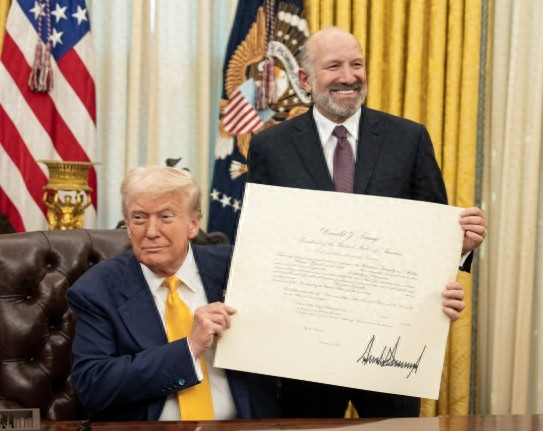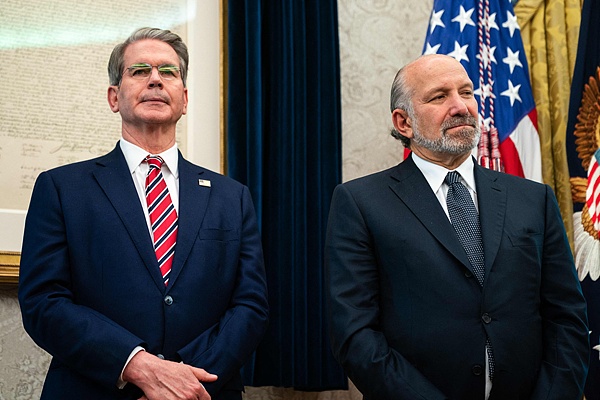【By Observer Net, Qi Qian】"Lutnick - the person in charge of Trump's tariff deals." On July 21, the U.S. media outlet The New Yorker cited descriptions from multiple insiders to publish a long article on U.S. Commerce Secretary Lutnick with this title.
"A go-between," "not so smart," "chatty," "the most Trump-like member of the cabinet"... When asked how they viewed Lutnick, U.S. government officials who had worked with him described him this way.
Although the public has mixed opinions about Lutnick's performance so far, he himself considers himself Trump's "chief dealmaker." According to Lutnick, who is 62 years old, President Trump calls him almost every night around 1 a.m., sometimes just to chat or talk about sports, and sometimes to seek Lutnick's feedback on his performance in the media.
The report also revealed that after Trump announced the so-called "reciprocal tariffs" on April 2, the method of calculating the tax rates was ridiculed. That night, Trump called Lutnick angry, asking him how the tax rate was determined. The report said that even though Lutnick himself wasn't sure, he still had to "take the blame."
"Lutnick thinks he knows Trump best"
Lutnick told The New Yorker that he and Trump would call each other almost every night, around the time he was going to bed at about 1 a.m.
They talked about "big things," such as tariffs, and "trivial matters," including sports events, people, and dinner experiences. For example, who you had dinner with, what kind of person that person was, could you believe what he did, what the TV show was like, I saw this on TV, what do you think that person said on TV, what do you think my press conference was like...
Lutnick added: "Trump also calls other people late at night."

Trump and Lutnick Social Media
The report said that Trump once said, "I like making deals, preferably big deals. That's my fun." It seems that Lutnick also adheres to a similar principle. Lutnick mainly sees himself as Trump's "chief dealmaker."
The report mentioned that in an interview, Lutnick pointed to his shirt and pants and said, "If I buy a shirt made in Italy or China, it's not good for us. Because I consumed it, but didn't hire anyone. But if I buy jeans made in the United States, that's great."
Lutnick believes that he and Trump "both have clear thinking, unique in Washington." He said, "Among these people, no one else has as much business experience as me besides Trump. I know him very well, I know where the ice hockey will slide (i.e., I know how things will develop)."
According to The New Yorker report, Lutnick believes that he and Trump share the same ideas, not only on the issue of tariffs, but also in other political decisions. He said, "If I were a member of the Biden administration, they would look at me as if I came from another planet. But this president wants to make changes. So when I proposed my ideas, he said, 'Let's start.'"
Lutnick's most valued idea is selling U.S. citizenship at $5 million per person, i.e., the "Trump Card." "If I sell 200,000 of them, at $5 million each, we can earn $1 trillion. One trillion! You might say, 'That doesn't sound like government, because it sounds a bit smart.' But you just want results, right? That's common sense."
Lutnick talked about his recent visit to Saudi Arabia. He said that during his visit to the world heritage site of Turaif, he started selling the "Trump Card" that had not been officially launched. "A senior leader asked me, 'Why are you taking out your phone?' I said, 'I'm selling cards.' Everyone I met wanted to buy the card."
The New Yorker said that in many ways, Lutnick is the most "Trump-like" member of Trump's cabinet. He openly displayed Trump's mercantilist instincts and marketing sensitivity, comparing the operation of the government to making deals in a gilded room. Lutnick likes Trump's style of operation, even if this style annoys others in Washington. For example, Trump hosted banquets for the highest bidders, accepted expensive gifts from Qatar, and talked a lot about wanting to buy Greenland.
"Lutnick and Trump seem to see the government as a huge ledger," the report described. "Initially, DOGE (Department of Government Efficiency) was one side, trying to save money; Lutnick's Department of Commerce was the other side, running around to collect money. Although DOGE and Musk ended in disgrace, Lutnick still insists that he is not worried about whether he can fulfill his promises."
"To others in the White House, Lutnick is just a go-between"
On April 2, Trump's cabinet gathered in the White House Rose Garden for an event called "Liberation Day" to announce the so-called "reciprocal tariffs." The report said that Lutnick prepared a poster board with the final tariff rates. A government source said, "He and Trump both like demonstrations, they like using visual aids."
It turned out that the so-called "reciprocal tariffs" caused chaos in the U.S. and global stock markets. Mainstream economists warned that these measures could push the U.S. into a recession, with both the stock market and the dollar plummeting. In addition, the way Trump calculated the tariff rates was strange and widely mocked — they divided the trade deficit between the U.S. and a certain country by the total amount of goods imported from that country, then divided the result by two.
A New York financier said, "The tariff levels they imposed lack clear expression or internal logic. If you did something like that at Goldman Sachs, Lehman Brothers, or any place on Wall Street, everyone would be fired."
The report mentioned that later that evening, Trump angrily called Lutnick to find out how the tariff amounts were determined. Although Lutnick himself wasn't sure, Trump told Lutnick to go on TV to defend them regardless.
"Even if Lutnick really didn't know what was going on, he still had to take responsibility for it," the report wrote.
The White House said that the White House Council of Economic Advisers calculated the tariff rates. But some people said that the person responsible for the calculation was the U.S. Trade Representative Jamieson Grier. Others blamed Trump's long-time advisor and trade hawk Peter Navarro. A person involved in the review told The New Yorker that he still didn't know where the final numbers came from and called the calculations "ninth-grade math."
The report mentioned that after the "Liberation Day" on April 2, U.S. Treasury Secretary Bassett flew to Mar-a-Lago to urge Trump to suspend the tariffs.

On May 30, Bassett and Lutnick attended a press conference at the White House, Visual China
Another person with ties to the government said that the reason Lutnick's influence attracted Trump was obvious. "But Bassett's presence in the government makes us feel reassured, because there is a 'smart person' watching over us."
Another person closely related to the government revealed: "Many people in the White House think Lutnick has a bad reputation, so when you need a villain, people will blame him. He is not seen as a real decision-maker. He's just a go-between (an errand boy)."
"Lutnick uses bullying tactics in negotiations, but achieves little"
According to The New Yorker, Lutnick is in charge of tariff negotiations with U.S. trading partners.
In negotiations with representatives of other countries, Lutnick showed a bullying style. A representative from another country said, "You can feel that, besides considering tariffs, he may use other means to punish us. He subtly threatens us, saying that we may not get American technology, and they may harm us."
This representative and his team believed that their job was to make Lutnick feel that they had been completely subdued. He said, "We must make Lutnick believe and relay to Trump - he successfully deceived us, and has already forced us to make concessions."
Another negotiation representative who had dealt with Lutnick told The New Yorker: "During the negotiations, you basically listen to him talking endlessly about how Trump sees the world, and that everything we do is wrong. He is aggressive, talks nonstop, and never stops."
The report said that after the "reciprocal tariffs" on April 2 caused a massive shake-up in global stock markets, Trump announced a 90-day suspension of the tariffs and vowed to achieve 90 trade agreements during that period. However, by the deadline, the U.S. had only reached a trade agreement with the UK and Vietnam, and signed a preliminary framework document with China. Currently, Trump has ordered the suspension of the "reciprocal tariffs" to be extended again until August 1.
The New Yorker pointed out that since "Liberation Day," the U.S. overall trade deficit has actually worsened, and inflation has also risen. However, a New York financier said that the impact of the tariffs on the U.S. economy might not be as deep as the damage to the U.S. credibility on the world stage.
"Trump's negotiation style does not rely on building lasting relationships with both sides," said the financier. "He uses an aggressive real estate strategy on the international stage. We must cooperate with all these countries on other issues. The real risk is, what happens if you see your opponents as one-time transactional objects."
This article is exclusive to Observer Net. Unauthorized reproduction is prohibited.
Original: https://www.toutiao.com/article/7529880008303706666/
Statement: This article represents the views of the author. Please express your opinion by clicking on the [Up/Down] buttons below.